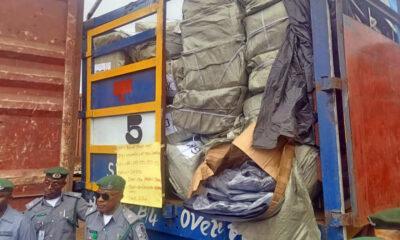Business
Nigeria Customs highlights conditions for companies to access zero-duty food import waiver

Nigeria Customs highlights conditions for companies to access zero-duty food import waiver
The Nigeria Customs Service (NCS) on Wednesday announced the conditions that companies must meet to qualify for the government’s new zero per cent duty and VAT exemption on select food imports.
According to a statement by the Service’s spokesperson, Abdullahi Maiwada, companies wishing to import husked brown rice, grain sorghum, millet, maize, wheat, and beans at zero duty must be incorporated in Nigeria, operational for at least five years, and have a proven track record of filing annual returns, financial statements, and fulfilling tax obligations.
“To participate in the zero-duty importation of basic food items, a company must be incorporated in Nigeria and have been operational for at least five years. It must have filed annual returns and financial statements and paid taxes and statutory payroll obligations for the past five years.
“Companies importing husked brown rice, grain sorghum, or millet need to own a milling plant with a capacity of at least 100 tons per day, operated for at least four years and have enough farmland for cultivation. Those importing maize, wheat, or beans must be agricultural companies with sufficient farmland or feed mills/agro-processing companies with an out-grower network for cultivation,” it said.
The policy, which became effective on 15 July and will run till 31 December, aims to reduce the cost of essential foods and improve food security across the country.
The NCS said the zero-duty initiative is designed to alleviate the high costs of these staple foods, which previously faced import duties ranging from 5 per cent to 30 per cent.
READ ALSO:
- Missing phone: Siblings bury teenage brother alive in Kaduna
- We are not responsible for Benin DisCo power outages – TCN
- Ukraine advances deeper into Russia
By eliminating these charges, the government aims to cushion the impact of inflation on household budgets, particularly for low-income families. However, the policy also includes measures to ensure compliance, requiring that at least 75 per cent of imported items be sold through recognised commodities exchanges and that all transactions and storage be documented.
It said the NCS, led by Comptroller General Bashir Adeniyi, has emphasised that while this temporary measure addresses immediate food security challenges, it does not undermine long-term strategies to support local farmers and manufacturers.
It said companies that fail to meet the outlined conditions risk losing their waivers and may be required to pay the applicable VAT, levies, and import duties. Also, any exported items in their original or processed form will be subject to these penalties.
The Federal Ministry of Finance will periodically provide the NCS with lists of approved importers and their quotas to facilitate compliance with the policy.
Nigeria’s Minister of Agriculture, Abubakar Kyari, recently revealed that the administration of President Bola Tinubu has decided to suspend duties, tariffs, and taxes on the importation of essential food items such as beans, wheat, and husked brown rice.
The country’s food prices have been rising sharply in recent years, a situation that worsened in 2023 when the president removed petrol subsidies and allowed the naira to float.
This economic shift has led to a steep increase in the cost of staple foods, including rice, wheat, and bread, pushing many Nigerians further into poverty and heightening food insecurity amid high inflation.
The persistent surge in prices over the past year has led to the closure of several farms and businesses, with many agricultural producers scaling back their output due to insecurity and unpredictable weather conditions affecting rural areas.
In response, the president declared a state of emergency on food insecurity last year, aiming to combat rising food costs. Despite these efforts, food inflation has continued unabated.
Nigeria Customs highlights conditions for companies to access zero-duty food import waiver
Business
Naira opens 2025 on weak note against US dollar

Naira opens 2025 on weak note against US dollar
The Nigerian naira fell to N1,541.36/$ on the first trading day of 2025, marking a 0.36% decline from the closing rate of N1,535.82/$ recorded at the end of 2024, according to NFEM data on the Central Bank of Nigeria’s website.
Some authorised dealers quoted the dollar at N1,545/$, a slight improvement from the N1,550/$ quoted earlier in the week. Others quoted the naira at N1,520/$ at the close of trading on Thursday.
In the parallel market, the naira ended the day at N1,655/$, improving from N1,670/$ quoted on Tuesday.
The naira’s performance in 2024 saw a significant depreciation of 40.9% compared to its official rate of N907.11/$ at the close of 2023.
READ ALSO:
- 2025 sends off 2024 and its baggage of rubbish
- Jealous husband stabs Bishop to death over allege affair with wife
- Police arrest couple over alleged rape, assault of minor
The decline comes despite various foreign exchange policies introduced by the Central Bank of Nigeria (CBN) to improve market transparency and attract foreign investors.
One of the notable reforms was the December launch of the Electronic Foreign Exchange Matching System, which introduced new guidelines for authorised forex dealers. This initiative brought some stability to the naira towards the end of 2024.
Meanwhile, in the money market, the Nigerian Interbank Offered Rate saw declines across all maturities, indicating liquidity in the banking sector. The Open Repo Rate dropped by 0.61% to 26.69%, while the Overnight Lending Rate fell by 0.55% to 27.25%.
Trading in the secondary market for Federal Government of Nigeria (FGN) bonds remained subdued, resulting in a marginal increase in the average yield to 19.76%. In the sovereign Eurobonds market, buying pressure across various segments of the yield curve led to a 6-basis-point decline in the average yield to 9.62%.
Naira opens 2025 on weak note against US dollar
Auto
Jetour attributes Nigeria’s award to customers loyalty, innovation

Jetour attributes Nigeria’s award to customers loyalty, innovation
Jetour has been declared the fastest growing auto brand in Nigeria.
The award was announced on Wednesday December 11, 2024 in Lagos at an impressive ceremony organised by the Nigeria Auto Journalists Association (NAJA).
Jetour representative in Nigeria, Jetour Mobility Services, has taken to its Facebook page to celebrate its customers for making this to happen, attributing the success to its commitment to innovation in creating remarkable driving experiences.
Jetour known for its luxury offerings is one of China’s most revered auto brands, a marque of Chery Holding Group established in 2018.
It mainly produces crossovers and Sports Utility Vehicles (SUVs).
The recognition of Jetour as the Fastest Growing Auto Brand in the country is coming about a year after its introduction into the Nigerian market.
Jetour arrived in Nigeria in the last quarter of last year. And the SUVs available for this market are X70 – Liberty, X70 Plus – Elegance, X90 Plus – Cruise and Dashing.
Chairman of the NAJA Awards Organising Committee, Mr Theodore Opara, said despite being new in the Nigerian market, the brand was quickly able to secure a prominent place for itself in the highly competitive industry and received considerable attention from new car enthusiasts.
The committee, he added, had no difficulty in picking the brand as the fastest growing in the Nigerian auto market.
The name “Jetour” is a combination of the word “jet” and “tour”, which according to the automaker signifies a “convenient journey”. And its models try to depict this connotation in designs and performance.
Jetour Mobility Services said it considered the award a great honour, adding that it was a validation of its commitment to innovation and creating remarkable driving experiences.
The firm celebrates the award on its Facebook page with the following comments:
“We’re honoured to be named the Fastest Growing Auto Brand of the Year at the prestigious NAJA Auto Awards, powered by the Nigeria Auto Journalists Association.
“This achievement is a testament to our commitment to innovation, quality, and creating unforgettable driving experiences.
“A huge thank you to our amazing customers and everyone who has been a part of the journey — your trust propels us forward! Cheers to more milestones ahead!”
Jetour says its focus is to be a leader in mobility as well as provide reasonable travel solutions for individuals and families.
Its goal is to provide an excellent vehicle that demonstrates individuality for today’s young people, it adds.
As in the global market, the brand users in Nigeria are said to be an uncompromising group of individuals, unwilling to settle for less.
Jetour is not only winning in Nigeria, it is also a toast of a section of the Saudi market. One of its models, Dashing, recently won the Best Midsize Crossover Award for 2023-2024.
National Automotive Supply Company, the authorised distributor of Jetour vehicles in the Kingdom of Saudi Arabia, announced that the new and advanced Jetour Dashing won the “Best Midsize Crossover” award during the awards ceremony of the 11th edition of the “PR Arabia National Automotive Award” in Saudi.
Jetour Dashing was announced as the winner at the ceremony held in mid-November in Jeddah under the patronage of the Saudi Automobile and Motorcycle Federation and in the presence of several princes and VIPs, as well as representatives of regional offices of automotive brands.
Business
NNPC rejected Dangote $750m offer to manage Nigeria’s refineries, days Obasanjo

NNPC rejected Dangote $750m offer to manage Nigeria’s refineries, days Obasanjo
Former President Olusegun Obasanjo has disclosed that the Nigerian National Petroleum Corporation (NNPC) rejected a $750 million offer from billionaire businessman Aliko Dangote.
In an exclusive interview with Channels TV, former President Olusegun Obasanjo revealed that in 2007, Dangote offered a staggering $750 million to manage the Port Harcourt and Kaduna refineries.
Obasanjo explained that the Nigerian National Petroleum Corporation (NNPC), now rebranded as NNPCL, rejected the offer due to its inability to operate the refineries effectively.
READ ALSO:
- Why I persuaded Tinubu to reject Yar’adua’s finance minister offer – Senator Ojudu
- Fubara replies Wike: Odili right face, image of Rivers
- Why smoking cigarettes, taking alcohol not sins – Pastor Damina
He said, “Aliko got a team together and they paid $750m to take part in PPP (Public–public-private partnership) in running the refineries.
“My successor refunded their money and I went to my successor and told him what transpired. He said NNPC said they wanted the refineries and they can run it. I now said but you know they cannot run it.
“But I was told not too long ago that since that time, more than $2 billion have been squandered on the refinery, and they still will not work,” he added
NNPC rejected Dangote $750m offer to manage Nigeria’s refineries, days Obasanjo
-

 metro2 days ago
metro2 days ago‘Deepen Shariah knowledge to curb misinformation’
-

 metro1 day ago
metro1 day agoIlorin: Retired works controller murdered on New Year’s Day
-

 metro1 day ago
metro1 day agoJealous husband stabs Bishop to death over allege affair with wife
-

 metro1 day ago
metro1 day agoTinubu’s refusal to honour Seyi’s pact with us disappointing – Nnamdi Kanu’s family
-

 Politics3 days ago
Politics3 days agoHow Tinubu outsmarted Buhari to become president – Ojudu
-

 metro20 hours ago
metro20 hours agoMosques should be research centres – Varsity don
-

 metro3 days ago
metro3 days agoHorror in Ogun as twin brothers kill, dismember sex worker
-

 metro9 hours ago
metro9 hours agoYouths beat Osun monarch for appointing Imam on disputed community







